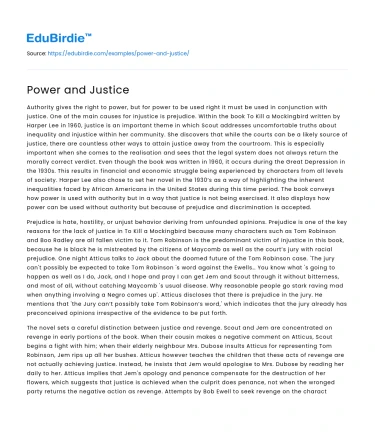Authority gives the right to power, but for power to be used right it must be used in conjunction with justice. One of the main causes for injustice is prejudice. Within the book To Kill a Mockingbird written by Harper Lee in 1960, justice is an important theme in which Scout addresses uncomfortable truths about inequality and injustice within her community. She discovers that while the courts can be a likely source of justice, there are countless other ways to attain justice away from the courtroom. This is especially important when she comes to the realisation and sees that the legal system does not always return the morally correct verdict. Even though the book was written in 1960, it occurs during the Great Depression in the 1930s. This results in financial and economic struggle being experienced by characters from all levels of society. Harper Lee also chose to set her novel in the 1930’s as a way of highlighting the inherent inequalities faced by African Americans in the United States during this time period. The book conveys how power is used with authority but in a way that justice is not being exercised. It also displays how power can be used without authority but because of prejudice and discrimination is accepted.
Prejudice is hate, hostility, or unjust behavior deriving from unfounded opinions. Prejudice is one of the key reasons for the lack of justice in To Kill a Mockingbird because many characters such as Tom Robinson and Boo Radley are all fallen victim to it. Tom Robinson is the predominant victim of injustice in this book, because he is black he is mistreated by the citizens of Maycomb as well as the court’s jury with racial prejudice. One night Atticus talks to Jack about the doomed future of the Tom Robinson case. 'The jury can't possibly be expected to take Tom Robinson 's word against the Ewells… You know what 's going to happen as well as I do, Jack, and I hope and pray I can get Jem and Scout through it without bitterness, and most of all, without catching Maycomb 's usual disease. Why reasonable people go stark raving mad when anything involving a Negro comes up'. Atticus discloses that there is prejudice in the jury. He mentions that 'the Jury can’t possibly take Tom Robinson’s word,' which indicates that the jury already has preconceived opinions irrespective of the evidence to be put forth.
The novel sets a careful distinction between justice and revenge. Scout and Jem are concentrated on revenge in early portions of the book. When their cousin makes a negative comment on Atticus, Scout begins a fight with him; when their elderly neighbour Mrs. Dubose insults Atticus for representing Tom Robinson, Jem rips up all her bushes. Atticus however teaches the children that these acts of revenge are not actually achieving justice. Instead, he insists that Jem would apologise to Mrs. Dubose by reading her daily to her. Atticus implies that Jem's apology and penance compensate for the destruction of her flowers, which suggests that justice is achieved when the culprit does penance, not when the wronged party returns the negative action as revenge. Attempts by Bob Ewell to seek revenge on the characters he believes have embarrassed him fail, the widow of Tom Robinson is protected, the judge is unharmed, and Scout and Jem mostly escape unhurt. Ironically, Bob Ewell is the only character who really suffers from his desire for revenge, because Boo kills him while he is attacking the kids.
Although Bob Ewell’s death provides some semblance of resolution for the novel and ensures that he is punished for his actions, it also distracts the reader from the permanently unresolved tragedy of Tom Robinson’s wrongful conviction. Although Bob Ewell’s passing may make up for his crime of assaulting the children, it does not alleviate the wrongs done to Tom. To Kill a Mockingbird Reveals the complexity of justice. There is no such possibility of redemption to the outcome of Tom’s trial, which is a flagrant miscarriage of justice and is never remedied. It is a clear example of how the use of power without authority is accepted because of prejudice and other racial issues.






 Stuck on your essay?
Stuck on your essay?

